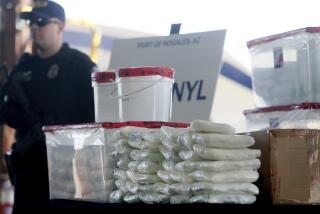U.S., China Will Pool Resources in Drug Fight
- Share via
BEIJING — The first U.S. anti-drug czar to visit China announced Monday that the two countries have signed an unprecedented agreement to share intelligence and evidence in combating the narcotics trade and related crimes.
Gen. Barry R. McCaffrey, the White House national drug policy director, said U.S. law enforcement agencies will begin working more closely with their Chinese counterparts to ferret out international crime rings dealing drugs, laundering money and smuggling arms.
McCaffrey even held out the possibility of opening an FBI office in Beijing, which would require an unusually high level of cooperation between two nations often on edge in their joint ties.
“We want to see an FBI presence in China” as there is in such countries as Russia and Mexico, McCaffrey told reporters Monday after two days of talks in the Chinese capital.
His is the first of two high-profile visits to China this week by Clinton administration officials. Secretary of State Madeleine Albright is expected to hold talks in the capital Thursday and Friday.
From Beijing, McCaffrey will head to the southern Chinese city of Kunming and then to Hong Kong. The retired army general’s four-day swing through China is part of a three-nation tour that will also take him to Vietnam and Thailand. The tour’s purpose is to promote international efforts to curb the heavy drug traffic emanating from the so-called Golden Triangle countries of Southeast Asia, where opium poppies are cultivated.
Southern China is a major conduit for drugs from the region--mostly heroin and cocaine but also, increasingly, methamphetamines, which get smuggled to Western destinations, including major U.S. cities.
The bulk of heroin seized in the U.S. comes from Mexico and Colombia, McCaffrey said. But China has become the leading producer of chemicals used in methamphetamine labs throughout Asia, U.S. officials say.
“Methamphetamine is a new and terrible challenge to the United States,” McCaffrey said. “These drugs are a threat to all the countries in the region.”
U.S. and Chinese agencies will share “strategic drug intelligence,” not just data on specific cases, he said. The two sides also plan to share information on drug “signature” analyses to better track drugs’ origins.
The exchange stems from a pledge by President Clinton and Chinese President Jiang Zemin three years ago to increase contact and cooperation in law enforcement.
Chinese and U.S. authorities have already had sporadic cooperation on various criminal investigations involving the two countries.
In one case about 1 1/2 years ago, Chinese and U.S. police ran a sting operation on a shipment of illegal diet pills bound for Los Angeles from China, a U.S. official here said.
Four agents, two Chinese and two Americans, accompanied the pills to L.A., where a fifth agent then nabbed a resident suspected of selling the pills.
The joint law enforcement efforts have sometimes placed the U.S. in the awkward position of working with the same Chinese police agencies accused of such human rights abuses as locking up political dissidents.
On Monday, the Beijing Morning Post reported that drug addicts in the Chinese capital must register with police within a month. Hard-core addicts who fail to register will be “severely punished” in labor camps, the newspaper said.
For its part, the Chinese government welcomed U.S. assistance in combating its rising problem with drugs, particularly heroin--a frightening reminder of the widespread addiction to opium in China in the 19th century. Illegal drugs were virtually wiped out after the Communist takeover in 1949, but they have made a comeback during the past 20 years of market reforms.
“They have ruined the health of our people, including our most precious national resource, which is our youth,” said Yang Fengrui, director of narcotics control at China’s Public Security Ministry.
More to Read
Sign up for Essential California
The most important California stories and recommendations in your inbox every morning.
You may occasionally receive promotional content from the Los Angeles Times.














